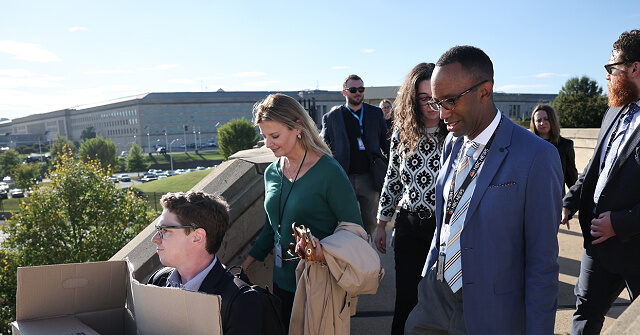The Pentagon’s Tuesday deadline for reporters to sign its new press access agreement has passed, and journalists from nearly every major media organization have turned in their badges and cleared their workspaces after refusing to comply with the Department of War’s revised credentialing policy.
Reporters were seen on Wednesday leaving the Pentagon as the Department of War enforced its new press policy requiring journalists to sign an acknowledgment of access and information-gathering rules. The department had set a Tuesday deadline to sign or return credentials, and those who refused were required to vacate their offices the following morning.
“Today, the Defense Department confiscated the badges of the Pentagon reporters from virtually every major media organization in America. It did this because reporters would not sign onto a new media policy over its implicit threat of criminalizing national security reporting and exposing those who sign it to potential prosecution,” the Pentagon Press Association wrote.
Pentagon spokesperson Sean Parnell defended the policy in a statement on Monday: “The policy does not ask for them to agree, just to acknowledge that they understand what our policy is. This has caused reporters to have a full blown meltdown, crying victim online. We stand by our policy because it’s what’s best for our troops and the national security of this country.”
Secretary of War Pete Hegseth said, “You would think that the Pentagon press corps, of all press corps, would be front and center across the board on wanting to give credit to the President for forging this kind of peace, and instead, what they want to talk about is a policy about them.”
“Maybe the policy should look like the White House or other military installations where you have to wear a badge that identifies that you’re press, or you can’t just roam anywhere you want,” he continued. “It used to be, Mr. President, the press could go anywhere, pretty much anywhere, in the Pentagon, the most classified area in the world.”
“If they sign on to the credentialing, they’re not going to try to get soldiers to break the law by giving them classified information,” he added. “So it’s common sense stuff. Mr. President, we’re trying to make sure national security is respected, and we’re proud of the policy.”
White House Director of Communications Steven Cheung posted on X that “a few reporters on this wall have privately said they were bullied into participating in the walkout when they actually wanted to stay. They were physically confronted and threatened with retaliation if they didn’t join the protest.”
The move follows news organizations, including the Washington Post, the New York Times, Reuters, the Atlantic, CNN, and NPR, all of which announced earlier this week that they would not sign the revised access form. Many cited concerns that the rules could chill reporting or blur the line between national security and public accountability.
The policy, finalized in September, requires credentialed journalists to sign an “in-brief” form acknowledging information security procedures, escort requirements, and limits on movement within the Pentagon. The Department of War maintains that the rules do not restrict reporting activities or require preapproval of coverage, but journalists argue that the language could expose them to potential retaliation or prosecution for pursuing unauthorized information.
Read the full article here
